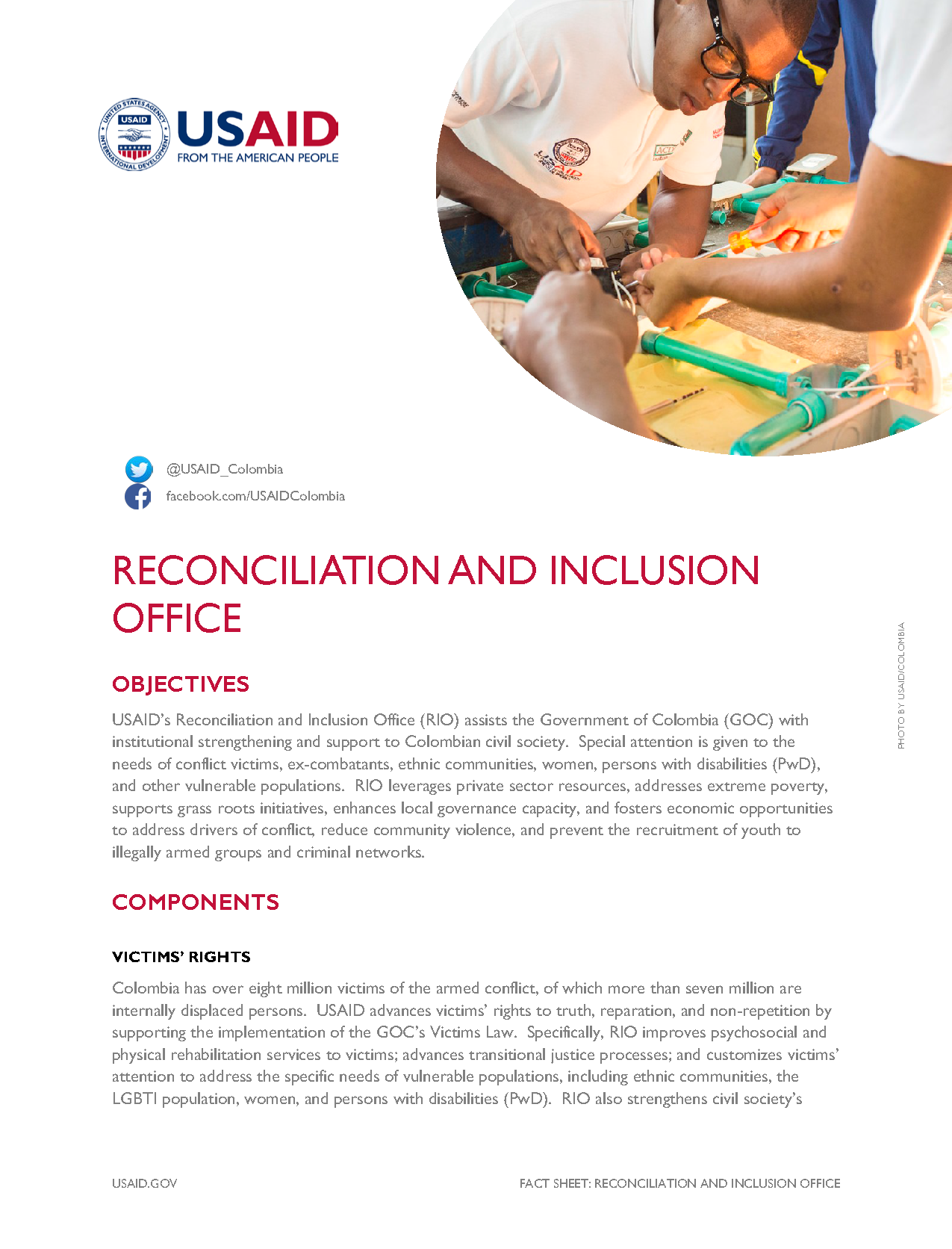Reconciliation and Inclusion Office (RIO) Fact Sheet ![]() (pdf - 267k)
(pdf - 267k)
OBJECTIVES
USAID’s Reconciliation and Inclusion Office (RIO) assists the Government of Colombia (GOC) with institutional strengthening and support to Colombian civil society. Special attention is given to the needs of conflict victims, ex-combatants, ethnic communities, women, persons with disabilities (PwD), and other vulnerable populations. RIO leverages private sector resources, addresses extreme poverty, supports grass roots initiatives, enhances local governance capacity, and fosters economic opportunities to address drivers of conflict, reduce community violence, and prevent the recruitment of youth to illegally armed groups and criminal networks.
COMPONENTS
Victims’ Rights
Colombia has over eight million victims of the armed conflict, of which more than seven million are internally displaced persons. USAID advances victims’ rights to truth, reparation, and non-repetition by supporting the implementation of the GOC’s Victims Law. Specifically, RIO improves psychosocial and physical rehabilitation services to victims; advances transitional justice processes; and customizes victims’ attention to address the specific needs of vulnerable populations, including ethnic communities, the LGBTI population, women, and persons with disabilities (PwD). RIO also strengthens civil society’s capacity to advocate for victim’s rights and promote positive change in communities affected by armed conflict. Support to victims is a critical first step in reducing the likelihood of new conflicts.
Conflict Prevention and Social Cohesion
Since 2006, USAID has supported the Colombian Agency for Reintegration (ACR) in the successful reintegration of demobilized or deserted ex-combatants from illegal armed groups. To better integrate ex-combatants into society and prevent recidivism to illicit economy activities, RIO supports ACR’s efforts to provide psychosocial services, formal education, vocational training, income generation assistance, and health care support. RIO assists the Colombian Institute for Family Welfare (ICBF) in responding to the basic needs (health, education, security, stable family environment) of disengaged child soldiers while strengthening the GOC’s prevention of recruitment activities and campaigns. RIO supports Colombian reconciliation through awareness on truth and memory, and an enhanced role of media in rural Colombia to promote transparent access to information. RIO also fosters public-private alliances to leverage private sector resources for the achievement of USAID objectives while also strengthening the licit economy in conflict-affected regions.
Inclusive Opportunities for Marginalized Populations
Citizen participation and engagement, inclusive of ethnic communities, is critical to building the foundation for peace. Afro-Colombians constitute approximately 10.62 percent of Colombia’s 45 million population. The Colombian government legally recognizes 82 indigenous communities, who constitute 3.4 percent of the population. Both populations are among the most marginalized groups in the country, and have suffered disproportionately from the conflict, facing displacement, violence, massacres, and the weakening of traditional social structures and cultural identity. In support of these communities, USAID increases licit economic opportunities, access to higher education and leadership training, political participation, and institutional capacity. In addition, RIO supports initiatives for women affected by violence, PwD, and LGBTI who have faced cultural and institutionalized discrimination.
RESULTS
- Leveraged $24 million in additional resources from public-private partnerships, since 2012, to achieve USAID objectives.
- Supported the establishment, and strengthened the capacity, of the GOC Victims’ Unit to register 8.3 million victims, a process critical for successful reconciliation.
- Assisted more than 15,000 ex-combatants in successfully completing the comprehensive reintegration process to become law-abiding Colombian citizens.
- Advanced the ICBF’s efforts to care for over 6,100 disengaged former child soldiers, and reach almost 250,000 at-risk children in recruitment prevention activities.
- Supported the issuance of collective land titles for 8,785 Afro-Colombian and indigenous families.
- Provided workforce development training to 12,196 Afro-Colombian and indigenous youth, of which over 91 percent gained formal employment.
- Collaborated with the Ethnic Commission to successfully advocate for the inclusion of an Ethnic Chapter in the Peace Accords.
- Enabled1,008 families to gain a comprehensive understanding of PwD rights, and assisted 64 public and private firms to reformulate internal policies to ensure inclusion of PwD.








Comment
Make a general inquiry or suggest an improvement.